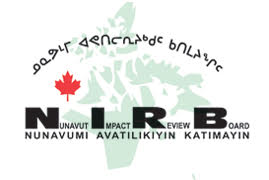Inuit Qaujimajatuqangit
There is an increasing expectation that government regulatory agencies integrate local or traditional knowledge with “scientific” knowledge in a number of resource areas. This is partly due to recognition that such knowledge can contribute to the conservation of biodiversity, rare species, protected areas, ecological processes, and to sustainable resource use in general. The incorporation of traditional knowledge into regulatory frameworks may also reflect a widespread concern regarding the social and economic sustainability of natural resource based livelihoods throughout the world. The term Inuit Qaujimajatuqangit refers to Inuit “Traditional Knowledge” while Inuit Qaujimaningit refers to Inuit Traditional Knowledge as well as Inuit epistemology without reference to temporality.
Guiding Inuit Qaujimajatuqangit Principles
The NIRB continues to be guided by the following Inuit Qaujimajatuqangit principles, as set out by the Government of Nunavut:
- ᐃᓅᖃᑎᒌᑦᓯᐊᕐᓂᖅ - Inuuqatigiitsiarniq Respecting others, relationships and caring for people.
- ᑐᙵᓇᕐᓂᖅ - Tunnganarniq
Fostering good spirit by being open, welcoming and inclusive. - ᐱᔨᑦᓯᕐᓂᖅ - Pijitsirniq
Serving and providing for family and/or community. - ᐋᔩᖃᑎᒌᓐᓂᖅ - Aajiiqatigiinniq
Decision making through discussion and consensus. - ᐱᓕᒻᒪᒃᓴᕐᓂᖅ - Pilimmaksarniq
Development of skills through observation, mentoring, practice, and effort. - ᐃᑲᔪᖅᑎᒌᓐᓂᖅ - Ikajuqtigiinniq
Working together for a common cause. - ᖃᓄᖅᑑᕐᓂᖅ - Qanuqtuurniq
Being innovative and resourceful. - ᐊᕙᑎᑦᑎᓐᓂᒃ ᑲᒪᑦᓯᐊᕐᓂᖅ - Avatittinnik Kamatsiarniq
Respect and care for the land, animals and the environment.
Implementation of Traditional Knowledge and Inuit Qaujimaningit
Within its documents and decisions, when the NIRB refers to traditional knowledge and Inuit Qaujimaningit, it is meant to encompass local and community based knowledge, ecological knowledge (both traditional and contemporary), which is rooted in the daily life of Inuit people, and has an important contribution to make to an impact assessment. The NIRB requires project proponents to not only incorporate traditional knowledge into the baseline collection and methodologies of resource management, but further outline where management strategies, mitigation and monitoring plans, and/or operational considerations employ values of Inuit Qaujimajatuqangit.
